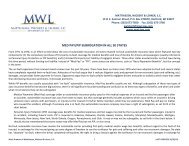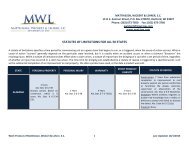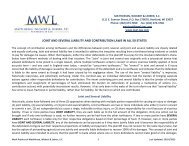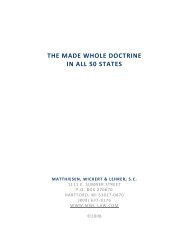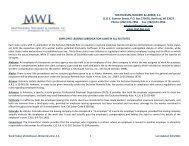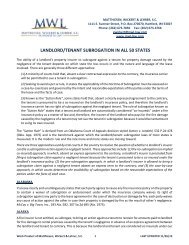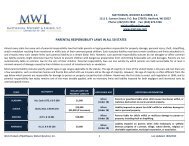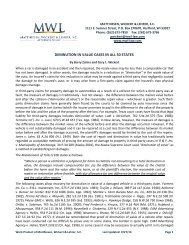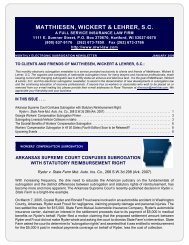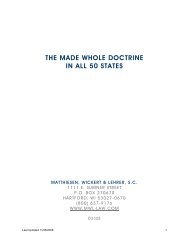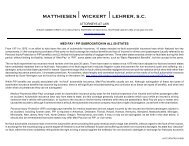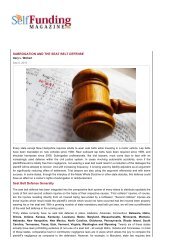spoliation of evidence in all 50 states - Matthiesen, Wickert & Lehrer
spoliation of evidence in all 50 states - Matthiesen, Wickert & Lehrer
spoliation of evidence in all 50 states - Matthiesen, Wickert & Lehrer
Create successful ePaper yourself
Turn your PDF publications into a flip-book with our unique Google optimized e-Paper software.
ights and deter future similar conduct. Id. (cit<strong>in</strong>g Schroeder v. Commonwealth Dep’t <strong>of</strong> Transp., 710 A.2d 23 (Pa.1998) (adopt<strong>in</strong>g the test from Schmid v. Milwaukee Elec. Tool Corp., 13 F.3d 76 (3 rd Cir. 1994)).RHODE ISLANDTORT OF SPOLIATION: Neither the Rhode Island legislature or the courts have yet established or recognized theexistence <strong>of</strong> an <strong>in</strong>dependent tort for <strong>spoliation</strong> <strong>of</strong> <strong>evidence</strong>. Mal<strong>in</strong>owski v. Documented Vehicle/Drivers Sys., Inc.,66 Fed. Appx. 216, 222 (R.I. 2003).ADVERSE INFERENCE: Rhode Island does recognize that an adverse <strong>in</strong>ference may be given as <strong>spoliation</strong> <strong>of</strong><strong>evidence</strong> <strong>in</strong>struction. Mead v. Papa Razzi Restaurant, 840 A.2d 1103, 1108 (R.I. 2004). The party seek<strong>in</strong>g the<strong>spoliation</strong> <strong>of</strong> <strong>evidence</strong> has the burden <strong>of</strong> pro<strong>of</strong> to establish that the destruction <strong>of</strong> <strong>evidence</strong> was deliberate ornegligent. Mal<strong>in</strong>owski v. United Parcel Serv., 792 A.2d <strong>50</strong>, 54-55 (R.I. 2002). Furthermore, it is not necessary toshow bad faith by the spoliator to draw the adverse <strong>in</strong>ference, however bad faith may strengthen the <strong>spoliation</strong><strong>in</strong>ference. Kurczy v. St. Joseph’s Veterans Ass’n, Inc., 820 A.2d 929, 946 (R.I. 2003).SOUTH CAROLINATORT OF SPOLIATION: There is no case law <strong>in</strong> South Carol<strong>in</strong>a discuss<strong>in</strong>g <strong>spoliation</strong> <strong>of</strong> <strong>evidence</strong>, specific<strong>all</strong>y.However, South Carol<strong>in</strong>a apparently recognizes a type <strong>of</strong> Adverse Inference Rule as it relates to loss ordestruction <strong>of</strong> <strong>evidence</strong>. Wiscons<strong>in</strong> Motor Corp. v. Green, 79 S.E.2d 718, 720-21 (S.C. 1954). It appears as thoughsuch <strong>in</strong>ference may be given when a party does not provide an explanation for its failure to produce appropriatedocuments. Id.SOUTH DAKOTAADVERSE INFERENCE: Under South Dakota law, if a party fails to present <strong>evidence</strong> or witnesses, such nonproductionjustifies an <strong>in</strong>ference that the <strong>evidence</strong> would be unfavorable. Cody v. Leapley, 476 N.W.2d 257, 264(S.D. 1991). “The non-production or suppression by a party <strong>of</strong> <strong>evidence</strong> which is with<strong>in</strong> his power to produce andwhich is material to an issue <strong>in</strong> the case justifies the <strong>in</strong>ference that it would be unfavorable to him if produced.”Id.; Leis<strong>in</strong>ger v. Jacobson, 651 N.W.2d 693, 699 (S.D. 2002). The burden <strong>of</strong> pro<strong>of</strong> with respect to the adverse<strong>in</strong>ference rule is on the spoliator to show that it acted <strong>in</strong> a non-negligent, good faith manner <strong>in</strong> destroy<strong>in</strong>g thedocument sought. Wuest v. McKennan Hosp., 619 N.W.2d 682, 686 (S.D. 2000). The spoliator must show heacted <strong>in</strong> good faith without negligence or malice <strong>in</strong> destroy<strong>in</strong>g the <strong>evidence</strong>. Id. A jury is required to determ<strong>in</strong>e ifthe explanation given is reasonable and if so, may not <strong>in</strong>fer that the miss<strong>in</strong>g <strong>in</strong>formation conta<strong>in</strong>ed unfavorable<strong>evidence</strong> to the oppos<strong>in</strong>g party. Id.TENNESSEEADVERSE INFERENCE: The Doctr<strong>in</strong>e <strong>of</strong> Spoliation <strong>of</strong> <strong>evidence</strong> permits a court to draw a negative <strong>in</strong>ferenceaga<strong>in</strong>st a party that has <strong>in</strong>tention<strong>all</strong>y, and for an improper purpose, destroyed, mutilated, lost, altered, orconcealed <strong>evidence</strong>. Foley v. St. Thomas Hosp., 906 S.W.2d 448, 453-54 (Tenn. Ct. App. 1995); Bronson v.Umphries, 138 S.W.3d 844, 854 -855 (Tenn. Ct. App. 2003).TEXASTORT OF SPOLIATION: Texas does not recognize an <strong>in</strong>dependent cause <strong>of</strong> action for <strong>in</strong>tentional or negligent<strong>spoliation</strong> <strong>of</strong> <strong>evidence</strong> by parties to litigation. Trev<strong>in</strong>o v. Ortega, 969 S.W.2d 9<strong>50</strong>, 951 (Tex. 1998).15Work Product <strong>of</strong> <strong>Matthiesen</strong>, <strong>Wickert</strong> & <strong>Lehrer</strong>, S.C. LAST UPDATED 4/22/2013



